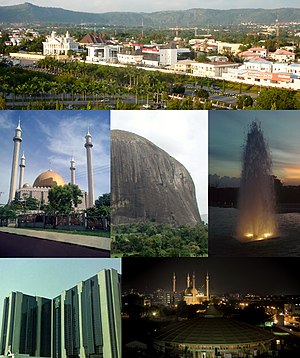Abuja
| Abuja | |
|---|---|
| Municipality | |
| Federal Capital City (FCC) Abuja Municipal Area |
|

From top (L-R): View of a street in Maitama District, Abuja National Mosque, Zuma Rock, fountain in Millennium Park, Central Bank headquarters, and skyline of CBD at night
|
|
| Location of Abuja in Nigeria | |
| Coordinates: 9°4′N 7°29′E / 9.067°N 7.483°ECoordinates: 9°4′N 7°29′E / 9.067°N 7.483°E | |
| Country |
|
| Territory | Federal Capital Territory |
| LGA(s) | Abuja Municipal Area Council (AMAC) |
| Settled | 1828 |
| Incorporated | 1 October 1984 |
| Declared capital | 12 December 1991 |
| Government | |
| • City Planner | Federal Capital Development Authority (FCDA) |
| • City Management | Abuja Metropolitan Management Council (AMMC) |
| Area | |
| • Municipality | 1,769 km2 (683 sq mi) |
| • Land | 1,728 km2 (667 sq mi) |
| • Water | 41 km2 (16 sq mi) |
| • Urban | 713 km2 (275 sq mi) |
| Elevation | 840 m (2,760 ft) |
| Population (2011 estimate) | |
| • Municipality | 1,235,880 |
| • Rank | 7th |
| • Density | 700/km2 (1,800/sq mi) |
| • Urban | 2,440,000 |
| • Urban density | 3,423/km2 (8,870/sq mi) |
| • Metro | 6,000,000 (estimated) |
| Time zone | WAT (UTC+1) |
| Postal code | 900211 to 900288 |
| Climate | Aw |
| Website | abujacity.com |
Abuja (/əˈbuːdʒə/) is the capital city of Nigeria. It is located in the centre of Nigeria, within the Federal Capital Territory (FCT). Abuja is a planned city which was built mainly in the 1980s. It officially became Nigeria's capital on 12 December 1991, replacing Lagos, though the latter remains the country's most populous city. Abuja's geography is defined by Aso Rock, a 400-metre (1,300 ft) monolith left by water erosion. The Presidential Complex, National Assembly, Supreme Court and much of the city extend to the south of the rock. Zuma Rock, a 792-metre (2,598 ft) monolith, lies just north of the city on the road to Kaduna State.
At the 2006 census, the city of Abuja had a population of 776,298, making it one of the ten most populous cities in Nigeria. According to the United Nations, Abuja grew at the rate of 139.7% between 2000 and 2010, making it the fastest growing city in the world. As of 2015[update], the city is still experiencing an annual growth of at least 35%, still retaining its position as the fastest-growing city on the African continent and one of the fastest-growing in the world. Abuja has witnessed a huge influx of people into the city; the growth has led to the emergence of satellite towns, such as Karu Urban Area, Suleja, Gwagwalada, Lugbe, Kuje and smaller settlements towards which the planned city is sprawling. The unofficial metropolitan area of Abuja has a population of well over three million, making it the fourth largest metropolitan area in Nigeria, surpassed only by Lagos, Kano and Ibadan. As at 2016, the metropolitan area of Abuja is estimated at 6 million persons.
...
Wikipedia

